
gwent-high-sheriff-1.jpeg
High Sheriff of Gwent Simon GIbson shows his sword to young boys in the South Wales community of Duffryn, United Kingdom. Screenshot from Facebook, courtesy of Church News.All rights reserved.This story appears here courtesy of TheChurchNews.com. It is not for use by other media.
By Scott Taylor, Church News
For the past year, Simon Gibson has served as the High Sheriff of Gwent.
That line raises all sorts of questions: What’s a high sheriff — is it anything like the Sheriff of Nottingham from Robin Hood lore or a Wild West sheriff? What or where is Gwent? And who is Simon Gibson?
For the record, the office of High Sheriff is an independent, nonpolitical royal appointment in England, Wales and Northern Ireland that lasts for a year. Gwent is a preserved county in southeastern Wales, in southwest Great Britain. And Simon Gibson is a Latter-day Saint wearing many hats, including that of the High Sheriff of Gwent for the past 12 months.
While the title of high sheriff sounds like a position of authority and ceremony — which it is — Gibson fulfilled the role in community service and with compassion, working closely with those in need and those providing assistance.
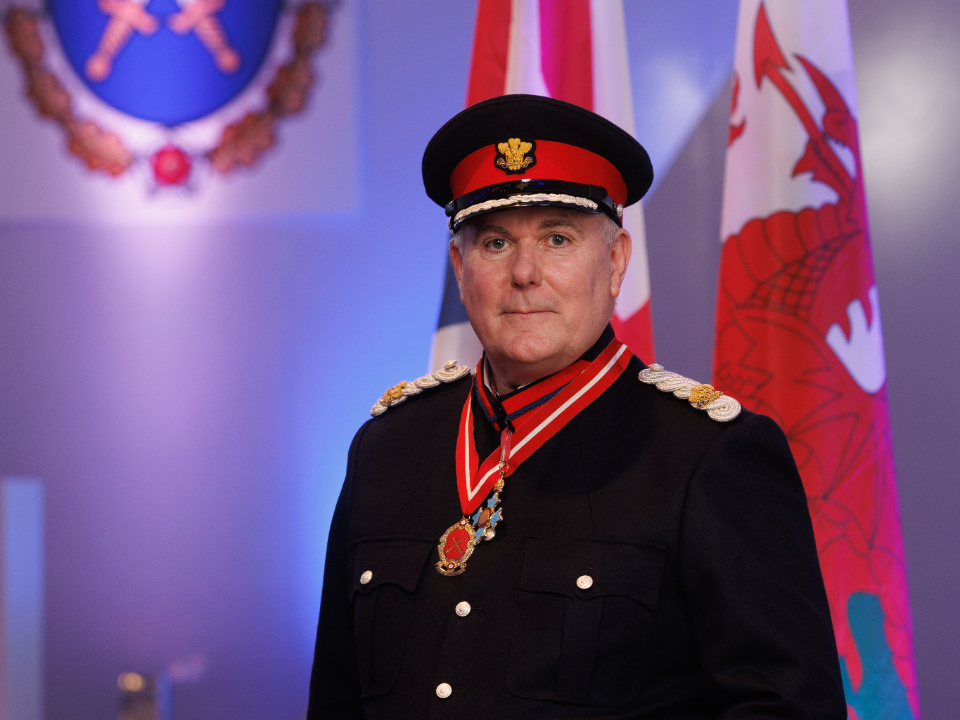
gwent-high-sheriff-2.jpg
High Sheriff of Gwent Simon Gibson, at his Declaration Ceremony on March 30, 2023, in Newport, United Kingdom. Photo by Steve Pope, courtesy of Church News.All rights reserved.Who Is Simon Gibson?
A husband to Susan Gibson and the father of four, Gibson is the chairman of Alacrity Graduate Entrepreneurship Foundation and chief executive of Wesley Clover Corporation, a global technology investment fund. He’s a board member of several technology companies and a non-executive director of the Celtic Manor Resort, the United Kingdoms’ largest leisure resort. He’s a regent of the Harris Manchester College at the University of Oxford and a professor at the Swansea University School of Management.
Previously, he was co-founder, president and CEO of Ubiquity Software Corporation, which pioneered the Session Initiation Protocol (SIP). Over the last 25 years, voice, video and data communications have moved from the global telephone network to the internet using SIP.
And high sheriff was Gibson’s latest royal appointment. He was made an Officer of the Order of the British Empire (OBE) in 1999 and Commander of the same order (CBE) in 2018 for his services to Wales’ industry, community and economy.
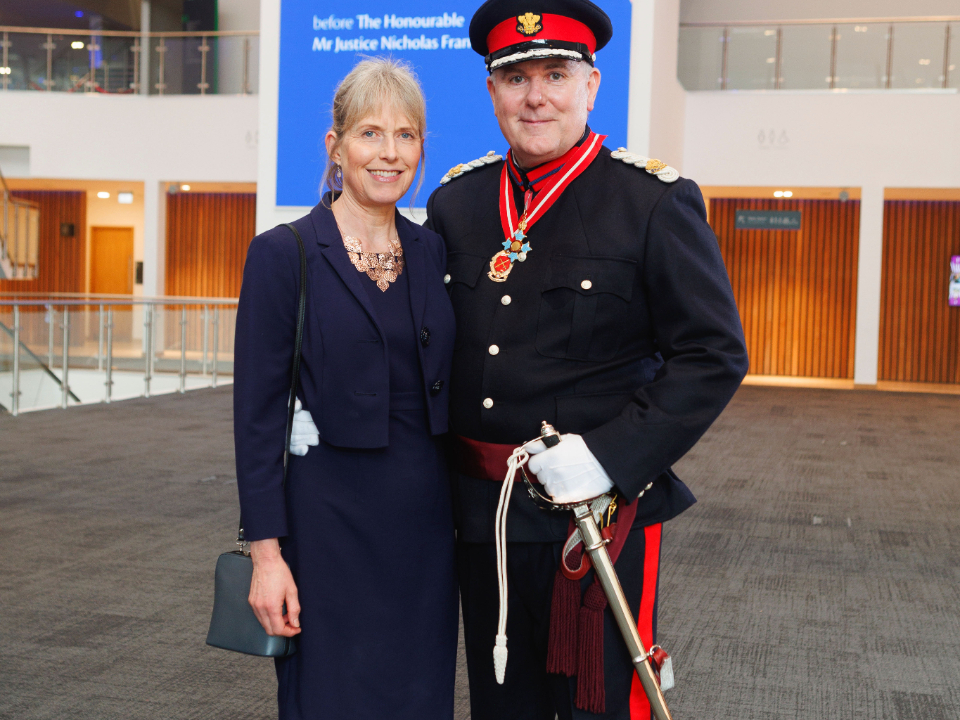
gwent-high-sheriff-3.jpg
High Sheriff of Gwent Simon Gibson, right, and his wife, Sue Gibson, at the March 30, 2023, Declaration Ceremony in Newport, United Kingdom. Photo by Steve Pope, courtesy of Church News.All rights reserved.High Sheriff History
The high sheriff — or the shrievalty — dates back some 1,200 years ago to Anglo-Saxon times. The shrieves were the king’s representatives in each county, with responsibilities over raising taxes, keeping law and order and supervising executions and elections. Even today, high sheriffs maintain a key role in the election of members of Parliament.
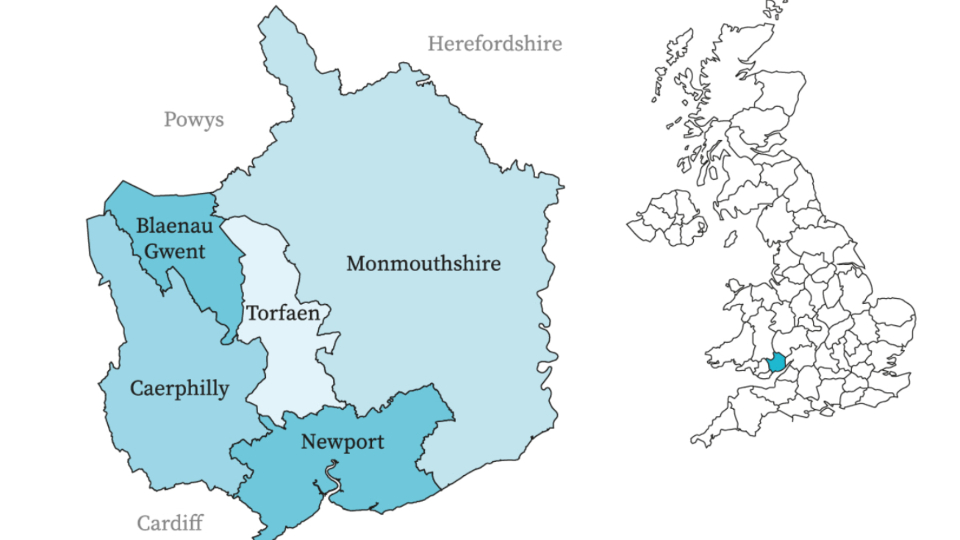
gwent-high-sheriff-4.jpg
Map of Gwent, in southwestern Great Britain. Photo provided by Simon Gibson, High Sheriff of Gwent, courtesy of Church News.All rights reserved.High sheriffs are selected in a centuries-old process known as a pricking ceremony. Presented a vellum parchment listing all nominees, the reigning monarch uses a silver bodkin — a needle-like instrument with a handle — to prick or punch a hole through the names of the high sheriffs.
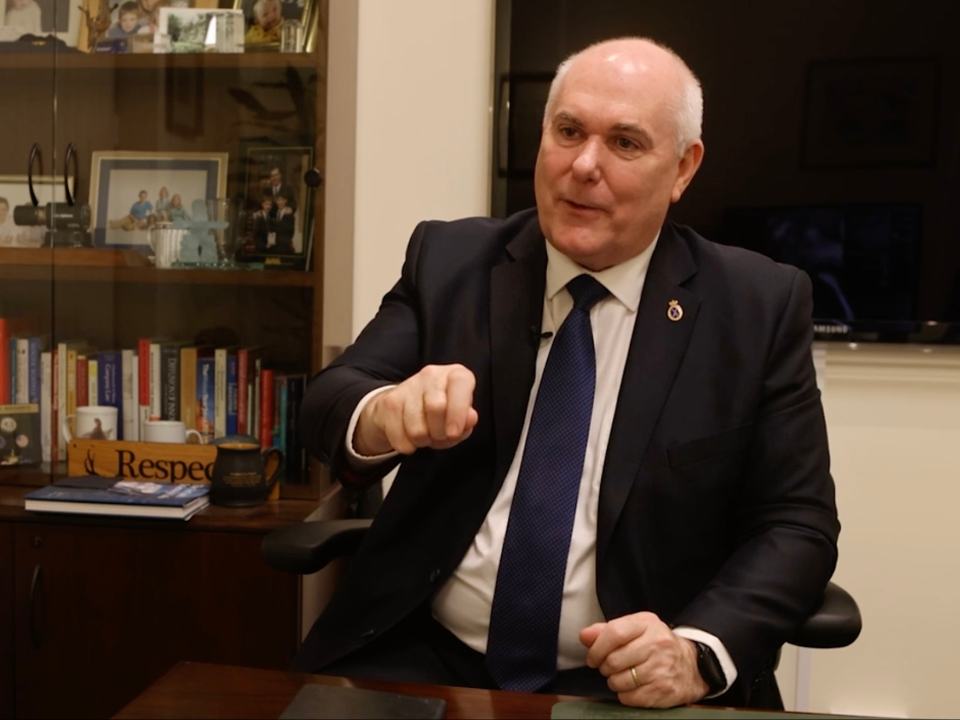
gwent-high-sheriff-5.jpg
Simon Gibson, the High Sheriff of Gwent, demonstrates the method of pricking used by the Monarch to select High Sheriffs at the pricking ceremony. He is interviewed December 7, 2023, at the Celtic House Manor. Photo by Brian Nicholson, courtesy of Church News.Copyright 2024 Deseret News Publishing Company.Gibson was one of the first high sheriffs to be pricked by His Majesty, King Charles III, in the monarch’s first ceremony after ascending to the throne.
The new High Sheriff of Gwent made his oath to the office and the monarch in a March 30, 2023, declaration ceremony at the Celtic Manor Resort’s new convention center, complete with a procession of 15 judges in all their robes and finery.
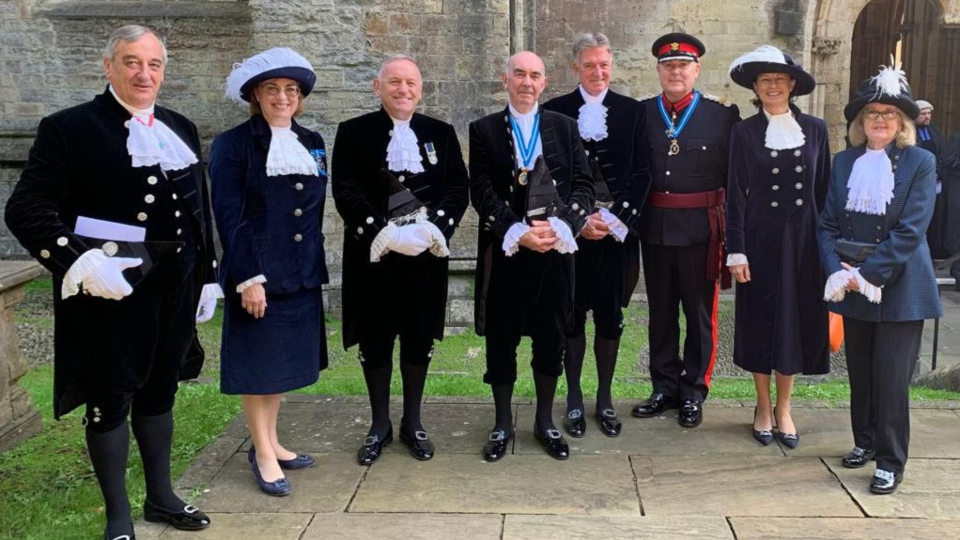
gwent-high-sheriff-6.jpg
High Sheriff of Gwent Simon Gibson, third from right, joins High Sheriffs from across Wales at the Llandaff Cathedral for a mid-term gathering in October 2023 in Cardiff, Wales. Screenshot from Facebook, courtesy of Church News.All rights reserved.Areas of Responsibility
A high sheriff has four areas of responsibility to provide service and support:
- To the crown and judiciary, escorting and extending hospitality to visiting members of the royal household or visiting high court judges.
- To blue-light services, such as the police, fire, ambulance and coast guard.
- To the community and voluntary sector.
- To interfaith efforts among various religions.
In June 2023, Gibson escorted His Royal Highness, the Prince of Wales, as Prince William inspected housing projects for the homeless. And this past February, the high sheriff accompanied the Princess Royal [Princess Anne] as she toured the Newport Medieval Ship project.

gwent-high-sheriff-7.jpg
His Royal Highness, the Prince of Wales, right, receives information from High Sheriff of Gwent Simon Gibson, center, as Prince William visits a modular housing project in Newport, Wales, in June 2023. Screenshot from Facebook, courtesy of Church News.All rights reserved.A high sheriff selects an under-sheriff and appoints a chaplain. While the appointee often is a local bishop or vicar from the established Church of England or Church of Wales, Gibson opted to select a fellow Latter-day Saint, Kate McColgan, who was already chairing the Interfaith Council of Wales.
“She was doing an absolutely exceptional job,” Gibson said. “So, when I asked her if she’d be my chaplain, she responded, ‘What would you have me do?’ And I said, ‘Just keep doing what you’re doing. But now you’ve got a cleric’s tippet scarf and a badge.’ "
One memorable interfaith event during his tenure came in November 2023, with 250 people — including senior government officials and ministers — gathered at the Cardiff Wales Stake Center.
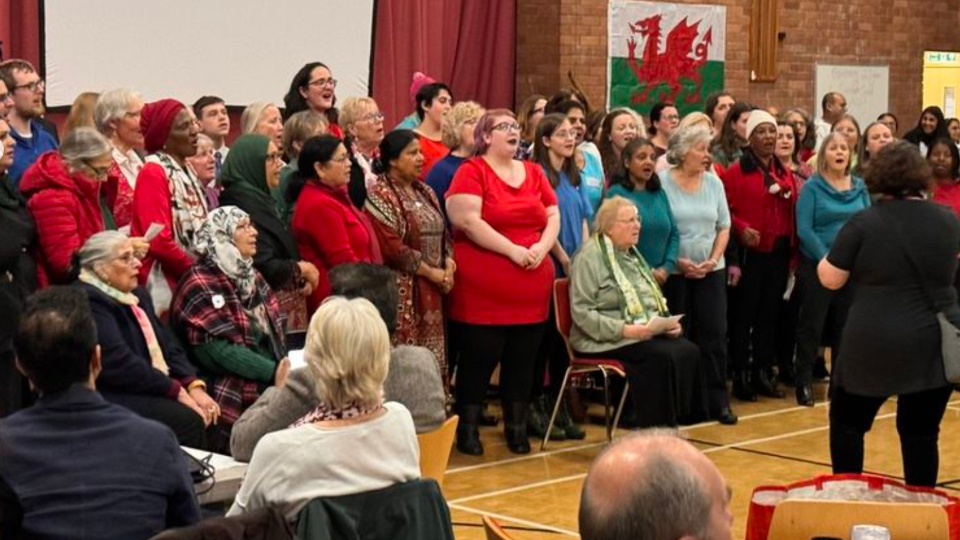
gwent-high-sheriff-8.jpg
At the 20th anniversary of the Interfaith Council of Wales held in November 2023, individuals of various faiths and beliefs join as a makeshift choir in flash-mob style to sing together. The event was held in a Latter-day Saint stake center in Cardiff, Wales. Photo courtesy of Church News.All rights reserved.“A flash choir broke out,” is how Gibson described a spontaneous moment, as Latter-day Saints first left their table to start singing, quickly joined by Muslims, Bahais, Baptists, Evangelicals, Buddhists and Hindus.
“The most powerful thing was watching them all gather at the front of the cultural hall by the stage, creating one mass choir of all faiths singing together,” he said. “Multiple faiths, with one united voice, standing together — it was a very moving experience.”
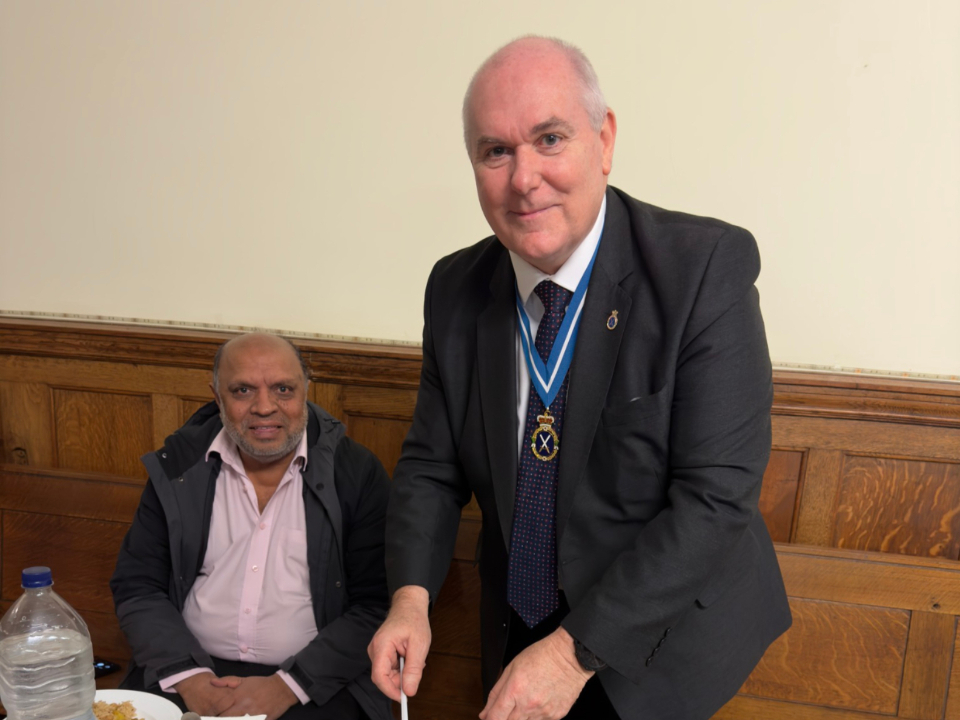
gwent-high-sheriff-9.jpg
High Sheriff of Gwent Simon Gibson participates in an iftar dinner celebrating the Muslim fasting of Ramadan at the Islamic Society for Wales and the Qasr E Abu Talib Mosque in Newport, Wales, in March 2024. Screenshot from Facebook, courtesy of Church News.All rights reserved.A Focus on Community Service
Acknowledging involvement in community service as a highlight of time as high sheriff, Gibson figures his appointment was in part due to a long history of public service, including involvement in economic development and community engagement. However, much of that previous engagement was theoretical and analytical.
“What the last 12 months has done is throw me right into the problem — not the theory, but the hard realities of poverty — and it’s crushing,” he said. “That’s what this office has done. But it has also motivated me to try and do something about it.”
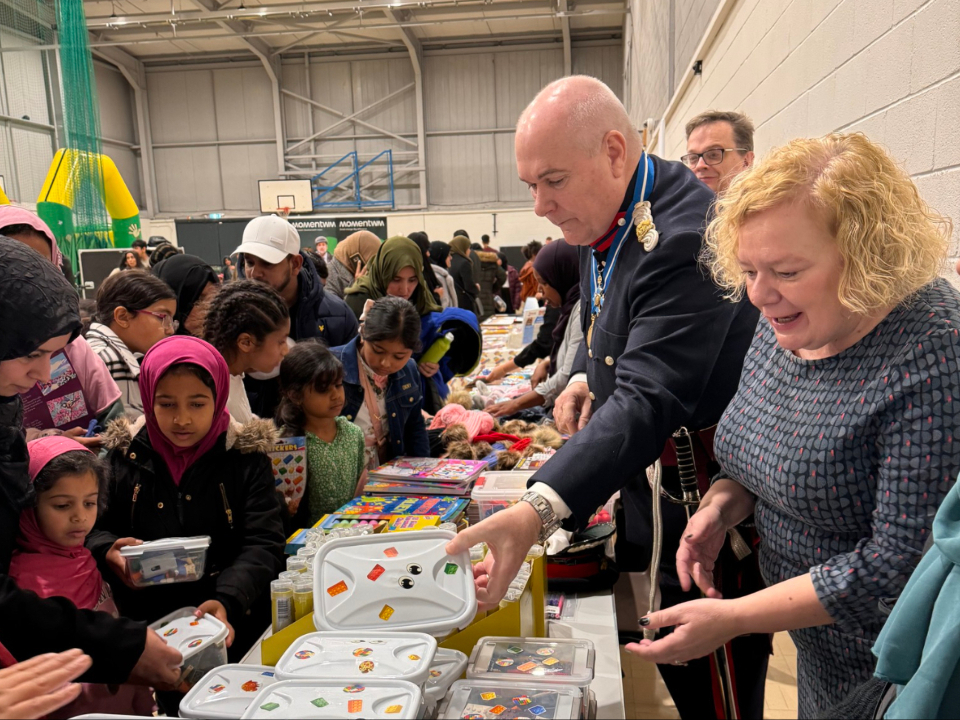
gwent-high-sheriff-10.jpg
High Sheriff of Gwent Simon Gibson, second from right foreground, helps distribute gifts to children after their Protect the Planet family event at KidCare4U in Newport, Wales, in mid-December 2023. Screenshot from Facebook, courtesy of Church News.All rights reserved.He has witnessed and worked with volunteers who day to day — sometimes for years — “are doing just the most remarkable, selfless acts, not a single act to tick a box and appease a conscience,” he said.
He has also learned the value of gratitude. “There are amazing people out there doing remarkable work that need to be thanked. Often I have found that those with the least often give the most, which is worthy of reflection.”
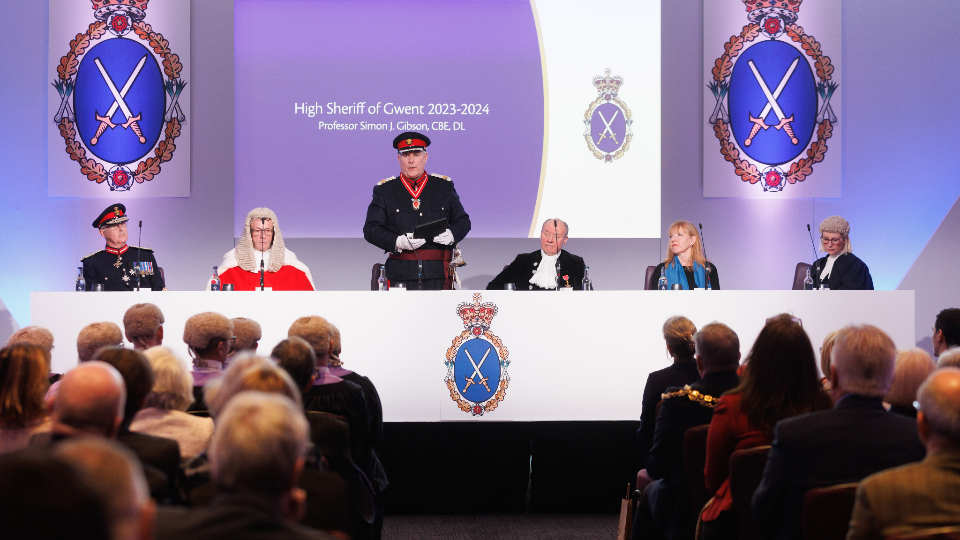
gwent-high-sheriff-11.jpg
High Sheriff of Gwent Simon Gibson, center, speaks at his March 30, 2023, declaration ceremony in Newport, United Kingdom. Photo by Steve Pope, courtesy of Church News.All rights reserved.As the high sheriff, Gibson had access to existing shrieval funds, drawing from a legacy endowment, that helps support youth groups with the intent to reduce crime and antisocial behavior. But as he went throughout Gwent — which includes the prosperity of Monmouthshire to some of the poorest regions in all of Western Europe, including families in fourth-generation unemployment — he found areas where basic needs were left wanting, including inadequate shelter or food insecurity. Some households faced the dilemma of directing limited funds to eating or to heating the residence?
Gibson recalled visiting with a group of ladies running a youth project who asked for a kitchen, saying it would be well if the children living there could have a single hot meal each week. They later informed him the situation had worsened, where children without any regular meals had started knocking on doors, asking for food.
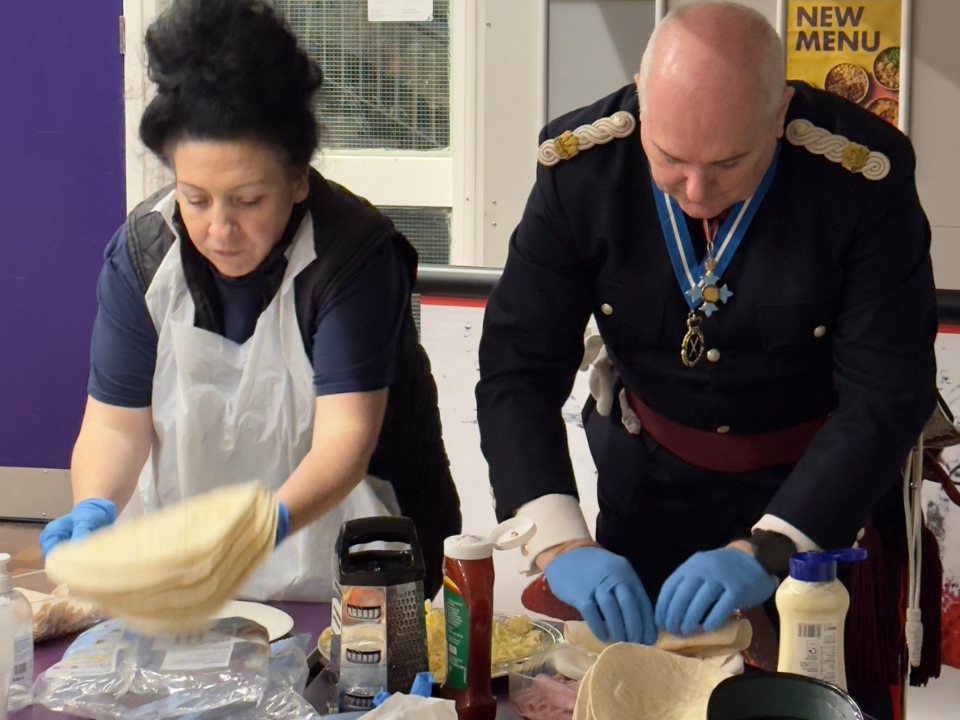
gwent-high-sheriff-12.jpg
High Sheriff of Gwent Simon Gibson, right, lends a hand in making wraps for children and youth at Duffryn Community Link near Newport, Wales. Screenshot from Facebook, courtesy of Church News.All rights reserved.To supplement funding community service efforts, Gibson sought additional assistance — but not just additional funds. “It’s easy just to think money can do the job,” he said.
He turned particularly to the business community and philanthropists and asked for “the three T’s” — time, talent and treasure.
“I welcome the treasure — we need treasure to make an impact,” he said of financial contributions, adding that even more can be done with an investment of talent and time.

gwent-high-sheriff-13.jpg
High Sheriff of Gwent Simon Gibson, second from right, joins Brownies and Guides of Girlguiding Gwent in using lemons, wire, coins and nails to make an electric circuit to power a small LED light in September 2023 in south Wales. Screenshot from Facebook, courtesy of Church News.All rights reserved.Gibson drew upon supply chains for food, such as turning to the Celtic Manor, one of Britain’s largest leisure resorts that purchases millions of pounds of food annually. Suppliers donated food, and the resort’s 120 chefs volunteered time to cook and help provide nutritious meals distributed throughout the area.
“You need a lot of people doing a little, instead of a few people doing a lot,” he said, “because the latter causes fatigue and weariness.”

gwent-high-sheriff-14.jpg
The Princess Royal, Princess Anne, right, is accompanied by High Sheriff of Gwent Simon Gibson, center, as she tours the Newport Medieval Ship project in Newport, Wales, February 2024. Screenshot from Facebook, courtesy of Church News.All rights reserved.Gibson also secured donations from the Church through its Europe North Area Presidency, Gail Miller of the Larry H. Miller Foundation and a number of anonymous donors. Part of the Church’s donation aided a local homeless shelter being supplied with food but dealing with a broken oven, he said. A professional-quality oven was purchased and the kitchen refitted to help the shelter feed the homeless.
The contributions from the Church, the Miller Foundation and other donors are having an enormous impact to help families and individuals throughout Gwent feel a sense of worth, Gibson said. “A single soul is worth more than all the treasure of the world. And yet, if I took you today into some of these communities, you would meet people who thought they were worthless.”

gwent-high-sheriff-15.jpg
High Sheriff of Gwent Simon Gibson, second from left, is pictured in August 2023 inside the Caffi Caredig, a mobile snack bar sponsored by The Parish Trust, a recipient of a three-year support grant from the Gwent High Sheriff's Community Fund. Screenshot from Facebook, courtesy of Church News.All rights reserved.‘Hope and a Vision’
What did Gibson learn about himself from his high sheriff’s role and responsibilities?
“It has humbled me tremendously, and it has made me appreciate the blessings that I’ve been given in life,” he said. “And it’s also made me realize that some people just need hope and a vision.”

gwent-high-sheriff-16.jpg
High Sheriff of Gwent Simon Gibson speaks to Brownies and Guides of Girlguiding Gwent in September 2023 in south Wales, United Kingdom. Screenshot from Facebook, courtesy of Church News.All rights reserved.To instill hope and vision, Gibson loaded up several buses with children from low-income families that had likely never left Wales, taking some to Oxford University and others to a prestigious London law firm. Through presentations, lunches and encouragement, “those children walked away with a whole new view of life” and an understanding of what they needed to do in school and life if they wanted to study or work at such locations, he said.
“A single experience like that can change the life of a child because someone’s saying to them, ‘You are of worth; in fact, you have infinite worth. And you can experience all of these things.’ … These communities have been acted upon for too long and never given the opportunity to act for themselves.”
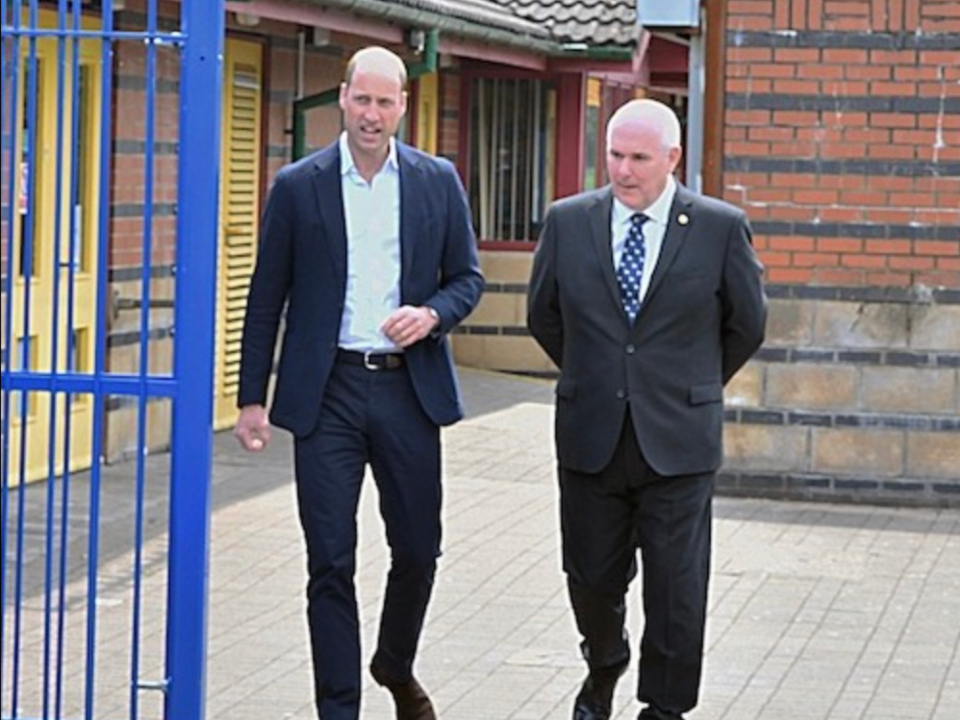
gwent-high-sheriff-17.jpg
His Royal Highness, the Prince of Wales, left, walks with High Sheriff of Gwent Simon Gibson as Prince William visits a modular housing project in Newport, Wales, in June 2023. Screenshot from Facebook, courtesy of Church News.All rights reserved.Copyright 2024 Deseret News Publishing Company.